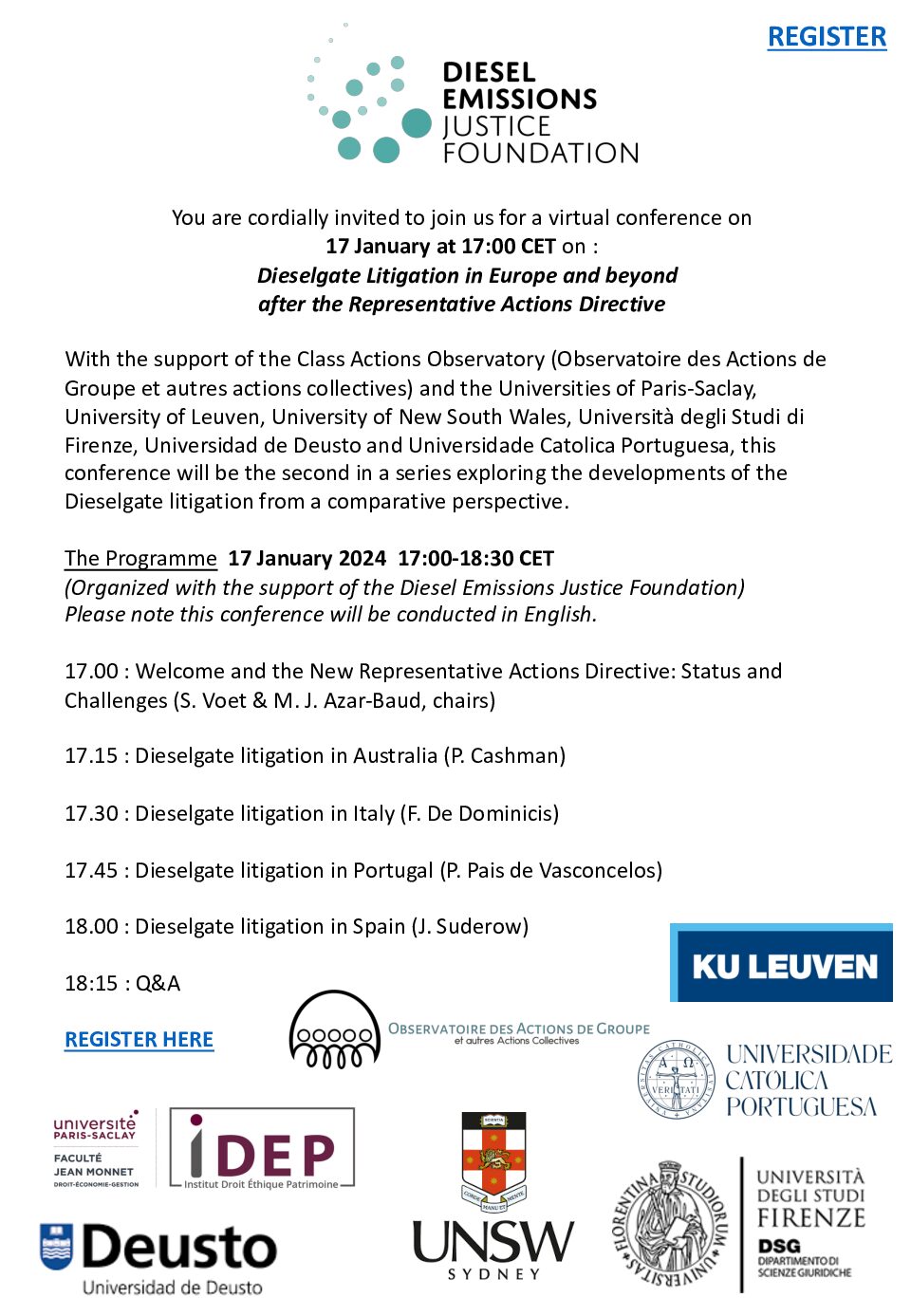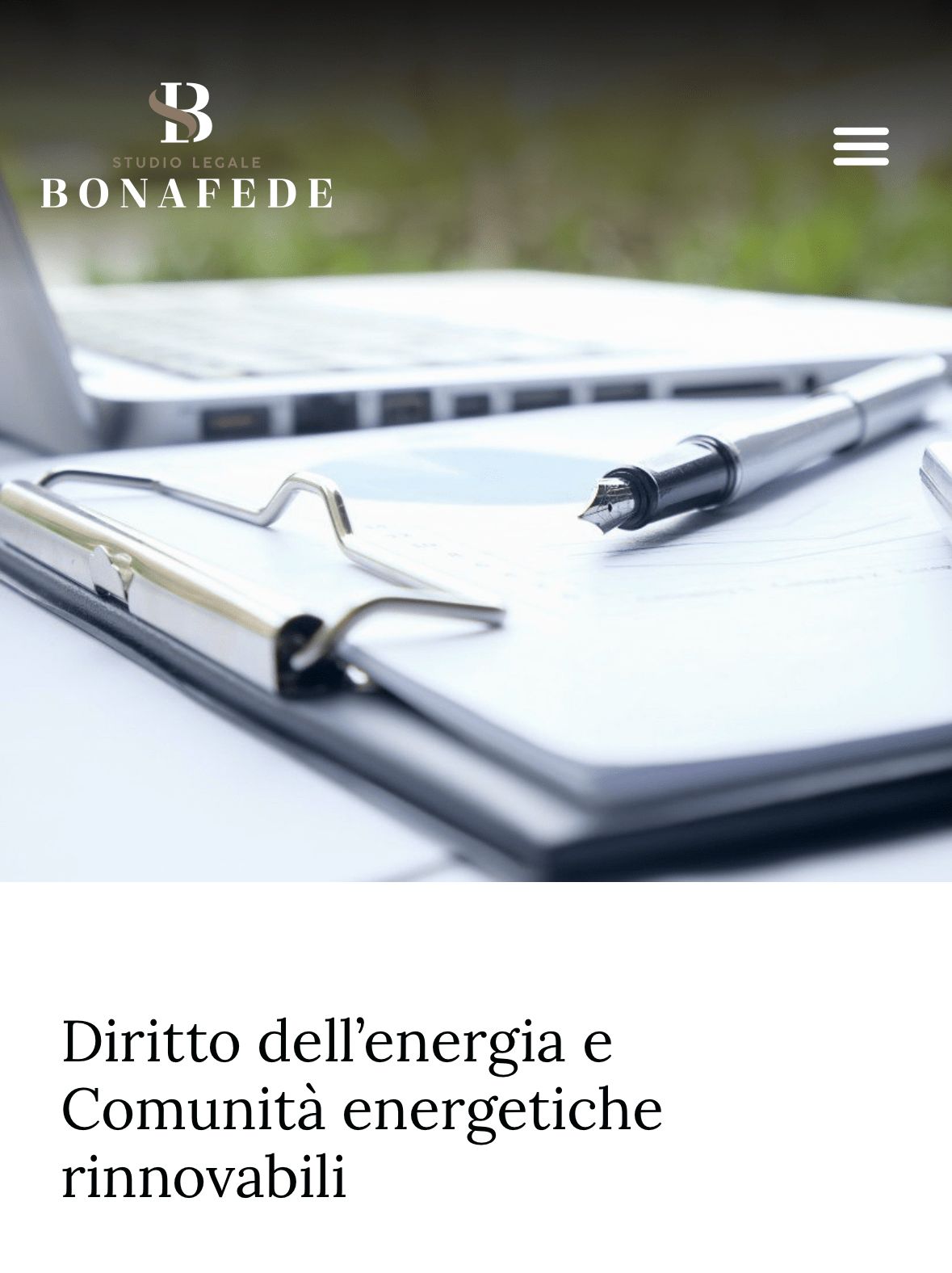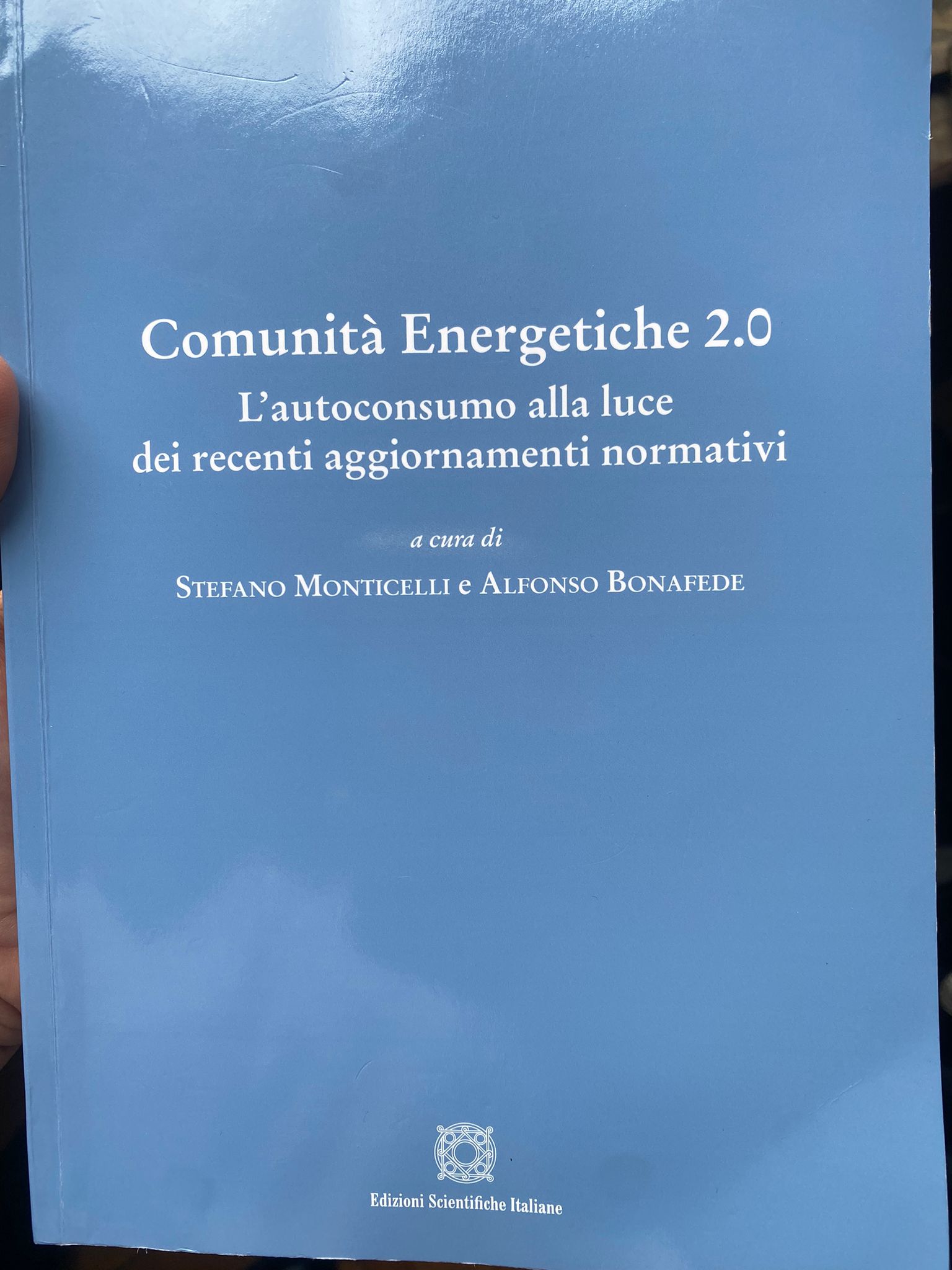Il 17 gennaio 2024, l’Avvocato Fabio De Dominicis ha partecipato come relatore al webinar internazionale, dal titolo “Dieselgate Litigation in Europe and beyond after the Representative Actions Directive”
All’incontro hanno partecipato illustri docenti universitari di diversi Paesi europei ed extraeuropei, i quali hanno rappresentato le evoluzioni dei procedimenti giurisdizionali afferenti il Dieselgate nei rispettivi Stati.
Di seguito il testo della relazione dell’Avvocato Fabio De Dominicis
***
Good afternoon everyone,
Firstly, I would like to express my gratitude to the Diesel Emission Justice Foundation and especially to Maria Josè and Stefaan for involving me in this prestigious event.
I prepare a small presentation to give you some informations about the Dieselgate litigation in Italy. I will start a brief mention of public enforcement and move than to private enforcement, discussing both individual cases and class actions. I will than conclude with some remarks on the trend in Europe concerning collective protection in general.
I DIESELGATE IN ITALY: PUBLIC ENFORCEMENT
In Italy, Dieselgate means Volkswagen Dieselgate because legal actions have been filed only against this automotive group; no other proceedings are initiated/prepared against other car manufacturers.
On August 4, 2016, with decision no. 26137, the Italian Competition Authorities imposed a fine of €5 million on Volkswagen Group Italia SpA (VWGI) and Volkswagen Aktiengesellschaft (VWAG) for unfair commercial practices against consumers, in violation of Articles 20, 21, and 23 of the Consumer Code. The ICA’s decision was confirmed by Administrative Courts on February 14, 2020, but it is likely that the penalty will be annulled following the decision of the CJEU Case C-27/22 | Volkswagen Group Italia and Volkswagen Aktiengesellschaft. This is in line with the principle of ne bis in idem, because VW has already paid a fine of 1 billion euros imposed in Germany by the Public Prosecutor’s Office of Braunschweig for the same beahviour.
II DIESELGATE IN ITALY: PRIVATE ENFORCEMENT – INDIVIDUAL LEVEL
As already mentioned early on, moving now to private enforcement, there have been several individual cases and one class action with different outcomes.
Individual cases can be divided into two categories:
1. claims for those pecuniary and non-pecuniary damages losses suffered by consumers due to VW’s unlawful conduct, which spans from false advertising to the crime of fraud in commerce.
Let me give you a few cases where compensation was granted:
– Tribunal of Avellino, December 10, 2020: Equitable quantification of pecuniary damages at 20% of the car’s price, (equitable damages are determined by the judge when she is satisfied that a damage was suffered, but it is too difficult or impossible to determine how much is the damage) (legal ground – consumer legislation) –
– Tribunal of Genova, October 5, 2021: Equitable quantification of pecuniary damages at 15% of the car’s price (legal ground – consumer legislation)
2.There are also cases where the compensation claim was rejected, and these can be divided into four groups:
1. Cases where the plaintiff sued VW Italy for contractual liability (legal ground – civil legislation), and the claim was rejected because VW Italy didnìt have standing because there was no contractual relationship with the plaintiff, as the car was sold by another car dealership not from VW Italy
• Tribunal of Patti, February 24, 2022.
• Tribunal of Termini Imerese, July 19, 2023.
• Justice of the peace of Genoa, Decision No. 2844/2016 – Tribunale of Genoa, March 7, 2019, No. 636 – Supreme Court, October 14, 2021.
2. Cases where the court rejected the compensation claim because the statute of limitation was expired (consumer legislation, the non-compliance defect of the car becomes time-barred 26 months from the delivery of the car by the seller)
• Tribunal of Trieste, October 7, 2022.
3. Cases where the court rejected the compensation claim because there is no evidence of the suffered damage. For example, the depreciation of the car was not proven through an accredited market survey, or that the car lost its “Euro 5” qualification, or that the pollutant emissions reduced the vehicle’s performance. Note that in this case the judge decides NOT to use her power to make an equitable quantification of damages.
• Justice of the peace of Rovigo, October 23, 2018, No. 606 – Tribunal of Rovigo, May 26, 2022, in the appeal stage.
4. Cases where the court rejected the compensation claim for contract rescision and refund of the car’s price because VW’s repaired the cheating software on the car (legal ground – consumer legislation)
• Tribunal of Trani, February 20, 2018, confirmed by Bari Appeals Court, February 4, 2021.
III DIESELGATE IN ITALY: PRIVATE ENFORCEMENT – CLASS ACTION
Let’s now move to the Italian Class Action proceedings (legal ground – consumer legislation, art. 140 bis consumer code):
A) Admissibility proceedings: – 1st instance Court of Venice: May 25, 2017; – 2nd instance: Court of Appeal of Venice: November 3, 2017
The Italian class action has a similar admissibility phase to the United States, and we have opt-in to aggregate the class, which took place in the 1st instance Court of Venice on May 25, 2017, and in the 2nd instance at the Court of Appeal of Venice on November 3, 2017, where the class action has been admitted, and the class certified with a total of 72,286 class members, which is more than 10% of the entire potential pool (600,000 vehicles involved). Altroconsumo, the consumers association who brought the action, did a good job with book building and making this the largest class action in Italy to these days.
B) After admissibility
– The Tribunal (1st instance Tribunal of Venice: July 7, 2021) granted the consumers claims finding that VW’s behavior a violated consumer’s right to self-determination and constituted a tort, recognizing pecuniary damage for the plaintiff, calculated by the different price for the purchase of a formally Euro 5 but of a lower class vehicle
Regarding the quantum, as there is no specific legal provision for compensation (such as Disgorgement of profits), the Court, drawing on solutions adopted in various European Union countries regarding the Dieselgate (Specifically Spain and Germany), adopted a criterion of equitable damage liquidation. It set a uniform parameter at 15% of the average purchase price of the vehicles involved in Italy in the case, ordering Volkswagen to compensate €3,000.00 for each consumer
Furthermore, the Judge considered Volkswagen’s unfair commercial practice attributable to the crime of fraud in commerce under Article 515 of the Criminal Code, condemning VW to compensate for the non-pecuniary damage, an amount equivalent to 10% of pecuniary damage was recognized for each consumer (300 euros). A small note of the 72.286 Class members, 8,100 were declared ineligible. Regarding Volkswagen’s strategy, they raised 46 different types of defences during the screening of individual class members’ subscriptions!!!). So 3.300 euro to about 64.000 consumers means around 200 million euro of total compensation: not bad!!!
– In the appeal, the Court of Appeal reduced the compensation from €200 million to €20 million (2nd Instance Court of Appeal of Venice: November 16, 2023, No. 2260).
What happened?
The Court of Appeal strongly underlined that in Italy civil liability is compensatory and that the Judge cannot grant punitive damages without an express legal provision allowing it. To be eligible for damages, hence, plaintiffs (even as a class) must give evidence of the actual harm suffered. While the wrongful conduct and the event (in Italian “danno evento”) were proven in this case, the actual damage suffered by the consumer (in Italian “danno conseguenza”) was not demonstrated. Therefore, the Court rejected the claim for pecuniary damages (eliminating the €3,000 compensation for class members). The rejection was based on two main arguments: 1) “no proof of the difference between the higher price paid by consumers for the purchase of Euro 5 certified Volkswagen vehicles and the actual market value of these vehicles”; 2) the free revision initiated by Volkswagen concerning the defeat device, constituting specific compensation through the car’s repair.
However, the Court confirms the compensation for moral damages imposed by the Tribunale at €300 for each consumer. The outcome of the case, perhaps disappointing from the perspective of class action supporters, reflects a debate in Italy regarding the compensatory or punitive nature of civil liability.
IV FINAL CONSIDERATION ABOUT CLASS ACTION TREND IN EUROPE
In conclusion, I would like to offer some suggestions on the world of class action. While these results and numbers may not be formidable, it’s often said that “data always talks.” However, sometimes data doesn’t reveal the whole picture. I prefer to conclude with a positive outlook, because I really believe that Europe and Italy are in a good position and have a great opportunity ahead for those who can seize it!
In Europe, class action is still a new tool, and such a high percentage of failures is entirely normal during this period who served as a training ground, especially for the parties involved and the judges, to become familiar with this new tool.
Moreover, it seems unwise to apply a temporal perspective of “here and now” to an instrument that must have a long-term view to be assimilated by society. In the United States, it took almost a hundred years before the class action became the formidable tool we all know, and I’m talking about the USA, where, as my friend Giacomo Paili said, entering the market is easy, the motto “one day you’re in, another day you’re out,” is part of the “American Dream,” and where judges and lawyers have different roles and also the civil proceedings is different from the European one, that can remove who have involved in illegal behaviour from the market, if necessary, through a class action with punitive damages.
We as Europeans, on the other hand, are a country with many barriers and obstacles to market entry for companies in the form of authorizations, licenses, preventive controls, with a market regulation system ex ante aimed at bringing companies into the market with greater difficulty. Once in the market, concerns focus on “innocent parties” – workers, families, suppliers who might lose their jobs if there were a very strong class action.
In a system like this, we cannot expect to do class actions in just a few years; it’s not possible!
Previously, it was said that the EU didn’t have a positive view of class action: it took the USA benchmark and proceeded by subtraction: no opt-out; no TPF; no punitive damages; no contingency fee, etc.
Now if we analyze the European trend, I believe there is an “Americanization” of class action in Europe and there is a strong tendency to reduce the differences between the U.S. and Europe on class action for these positive factors:
1. RAD promotes convergence, alongside the emergence of new and more efficient domestic class actions.
2. Presence of opt-out mechanisms, including late opt-in models in some European states.
3. Utilization of third-party funding.
4. Implementation of contingency fee-like structures in certain European states (e.g., the new Italian Class Action).
5. Rules resembling punitive damages, as seen in the draft of the Directive’s transposition by France – civil penalties for fraudulent behavior, up to 5% of turnover.
6. The concept of “Stronger Together” – successful coordination between states, exemplified in cases like Euroconsumers/HP.
7. Establishment of major U.S. law firms in key European cities, showcasing an entrepreneurial lawyer style.
All these factors combined lead us to assert that the wind is changing in Europe
I have concluded. Thank you for your attention.







